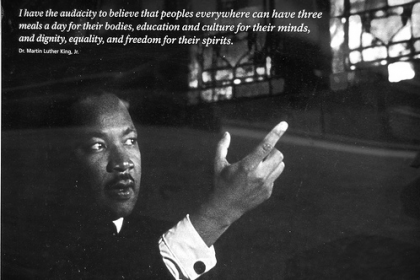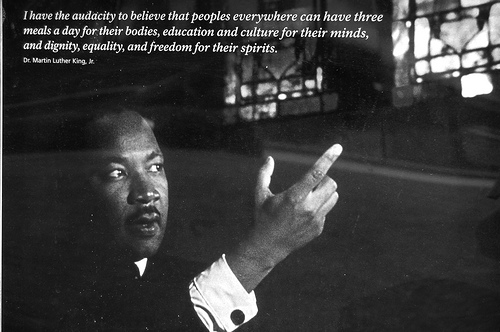
 One of the gifts of MLK Day is the opportunity to reflect on how Dr. Martin Luther King, Jr.’s legacy can inspire our work for social justice. I say social justice because the work that I do is rooted in sustainability, and social justice is core to the concept regardless of whether I engage it through food systems, climate change mitigation and adaptation, ecosystem health, or cultural health and diversity. All of these issues are deeply interrelated and bound together in an intergenerational ethic of justice.
One of the gifts of MLK Day is the opportunity to reflect on how Dr. Martin Luther King, Jr.’s legacy can inspire our work for social justice. I say social justice because the work that I do is rooted in sustainability, and social justice is core to the concept regardless of whether I engage it through food systems, climate change mitigation and adaptation, ecosystem health, or cultural health and diversity. All of these issues are deeply interrelated and bound together in an intergenerational ethic of justice.
In thinking about the great civil rights icon and spiritual leader this year, I found myself drawn to the black prophetic tradition that Dr. King inherited, interpreted and bequeathed, at far too young an age, to the generations that followed. My scant understanding of this tradition comes primarily from reading and listening to Cornel West, whose unflinching defense of that tradition and concern for its survival have captured my imagination, particularly when he argues that “moral integrity, political consistency, and systemic analysis sit at the center of the Black prophetic tradition” and that its loss is a great loss for us all and our democracy.
In June 2013, we closed our third annual New England Food Summit with a commitment to put racial equity and food justice at the center of our work as the Food Solutions New England (FSNE) network. As a predominantly white network of food system and sustainability practitioners, advocates, and academics, we realized that the freedom we had to put forth a desirable vision of the region’s future food system carried with it a responsibility to build that vision on a solid foundation of justice. The New England Food Vision, a central part of FSNE’s work, clearly identified its core values, including the right to food as a human right, and a food future in which everyone has access to adequate food, everyone enjoys a healthy diet, food is sustainably produced, and food helps build thriving communities.
The critical step that we took in 2013 was to pull those values down to the ground in our contemporary New England, embedded as it is in a national and international food system where the dispassionate violence of structural racism had become such a seemingly natural part of our lives as to be almost invisible, and to name racial equity and food justice as a primary driver of FSNE’s work going forward. The resulting journey we’ve begun will only be successful if we undertake it with the same “moral integrity, political consistency, and systemic analysis” that Cornel West locates at the center of the Black prophetic tradition.
In speaking of that tradition and Dr. King’s role within it, Andre Johnson illustrated those principles at work in King’s prophetic leadership. Why King’s decision to publicly oppose the Vietnam war in the “Beyond Vietnam” speech he gave in 1967 when it would risk alienation of political allies in the Civil Rights struggle? Johnson’s answer: “He was a prophet.” In other words, his moral integrity, political consistency, and systemic analysis compelled him to speak. So on this MLK Day, let’s allow the inspiration of Dr. King’s leadership to awaken or affirm our own prophetic thoughts and actions to build a truly sustainable food system.
Tom Kelly is the founding director of the Sustainability Institute at the University of New Hampshire that serves as the convener of Food Solutions New England.




